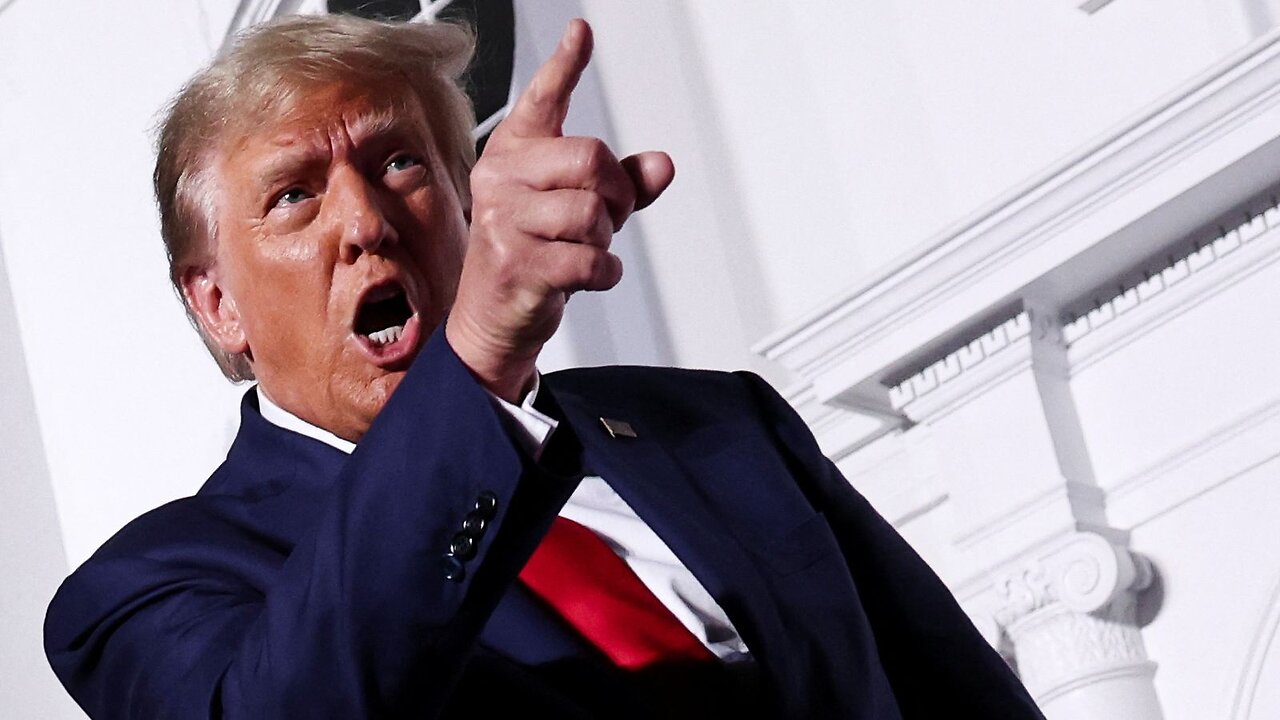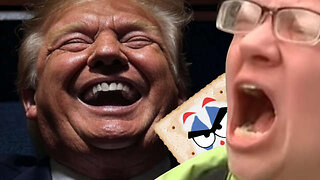Premium Only Content

BIG WIN FOR AMERICA🦾👊🏽TRUMP SAYS, AFTER SUPREME COURT ALLOWS HIM TO KEEP RUNNING
#Democrat #Republican #presidentdonaldtrump #republicday #barakobama #billclinton #georgebush
Alright! We move on to the news headline and updates: LIVE! US supreme court ruling allows Trump to stay on primary ballots nationwide. Ruling set to allow Trump to stay on ballots nationwide
The US supreme court’s unanimous ruling overturning a decision by Colorado’s top court that barred Donald Trump from the ballot for his involvement in January 6 will resolve the question of the former president’s ability to run for office nationwide.
At issue was whether states could enforce section three of the 14th amendment to disqualify someone from running for federal office, such as the presidency. That part of the constitution has been cited by state-level judges, including in Colorado, who removed Trump from ballots in lawsuits brought by pro-democracy groups.
In their decision, the US supreme court writes:
We conclude that States may disqualify persons holding or attempting to hold state office. But States have no power under the Constitution to enforce Section 3 with respect to federal offices, especially the Presidency. While no members of the court’s three-justice liberal minority dissented, they make clear in their concurrence that they aren’t happy with the conclusion reached by the majority.
They open with a quote from the conservative chief justice John Roberts’s concurrence in Dobbs v. Jackson Women’s Health Organization, the 2022 decision that overturned Roe v Wade and allowed states to ban abortion, where he writes: “If it is not necessary to decide more to dispose of a case, then it is necessary not to decide more.”
The liberals argue that the majority weighed in on more issues than were necessary in their ruling keeping Trump on the ballot:
Today, the Court departs from that vital principle, deciding not just this case, but challenges that might arise in the future. In this case, the Court must decide whether Colorado may keep a Presidential candidate off the ballot on the ground that he is an oath breaking insurrectionist and thus disqualified from holding federal office under Section 3 of the Fourteenth Amendment. Allowing Colorado to do so would, we agree, create a chaotic state-by-state patchwork, at odds with our Nation’s federalism principles. That is enough to resolve this case. Yet the majority goes further. Even though “[a]ll nine Members of the Court” agree that this independent and sufficient rationale resolves this case, five Justices go on. They decide novel constitutional questions to insulate this Court and petitioner from future controversy … Although only an individual State’s action is at issue here, the majority opines on which federal actors can enforce Section 3, and how they must do so. The majority announces that a disqualification for insurrection can occur only when Congress enacts a particular kind of legislation pursuant to Section 5 of the Fourteenth Amendment. In doing so, the majority shuts the door on other potential means of federal enforcement. We cannot join an opinion that decides momentous and difficult issues unnecessarily, and we therefore concur only in the judgment.
They sum up their argument by accusing the majority of trying to water down laws that bar insurrectionists from federal office:
By resolving these and other questions, the majority attempts to insulate all alleged insurrectionists from future challenges to their holding federal office. While no members of the court’s three-justice liberal minority dissented, they make clear in their concurrence that they aren’t happy with the conclusion reached by the majority.
They open with a quote from the conservative chief justice John Roberts’s concurrence in Dobbs v. Jackson Women’s Health Organization, the 2022 decision that overturned Roe v Wade and allowed states to ban abortion, where he writes: “If it is not necessary to decide more to dispose of a case, then it is necessary not to decide more.”
The liberals argue that the majority weighed in on more issues than were necessary in their ruling keeping Trump on the ballot:
Today, the Court departs from that vital principle, deciding not just this case, but challenges that might arise in the future. In this case, the Court must decide whether Colorado may keep a Presidential candidate off the ballot on the ground that he is an oath breaking insurrectionist and thus disqualified from holding federal office under Section 3 of the Fourteenth Amendment. Allowing Colorado to do so would, we agree, create a chaotic state-by-state patchwork, at odds with our Nation’s federalism principles. That is enough to resolve this case. Yet the majority goes further. Even though “[a]ll nine Members of the Court” agree that this independent and sufficient rationale resolves this case, five Justices go on. They decide novel constitutional questions to insulate this Court and petitioner from future controversy … Although only an individual State’s action is at issue here, the majority opines on which federal actors can enforce Section 3, and how they must do so. The majority announces that a disqualification for insurrection can occur only when Congress enacts a particular kind of legislation pursuant to Section 5 of the Fourteenth Amendment. In doing so, the majority shuts the door on other potential means of federal enforcement. We cannot join an opinion that decides momentous and difficult issues unnecessarily, and we therefore concur only in the judgment.
They sum up their argument by accusing the majority of trying to water down laws that bar insurrectionists from federal office:
By resolving these and other questions, the majority attempts to insulate all alleged insurrectionists from future challenges to their holding federal office. Beneath the supreme court’s unanimous opinion on Donald Trump’s eligibility to run for president were deep fractures over how far the decision should go.
We’ll start off with the majority’s view, which was signed onto by five of the court’s conservative justices – chief justice John Roberts and associate justices, Clarence Thomas, Samuel Alito, Neil Gorsuch and Brett Kavanaugh.
Fearing that allowing states to enforce the constitution’s disqualification clause would upend presidential elections, the opinion reads:
An evolving electoral map could dramatically change the behaviour of voters, parties, and States across the country, in different ways and at different times. The disruption would be all the more acute, and could nullify the votes of millions and change the election result – if Section 3 enforcement were attempted after the Nation has voted. Nothing in the Constitution requires that we endure such chaos - arriving at any time or different times, up to and perhaps beyond the Inauguration.
For the reasons given, responsibility for enforcing Section 3 against federal officeholders and candidates rests with Congress and not the States. The judgment of the Colorado Supreme Court therefore cannot stand. 'BIG WIN FOR AMERICA!!!' TRUMP SAYS, AFTER SUPREME COURT ALLOWS HIM TO KEEP RUNNING
The headline says it all. In a post on Truth Social following the supreme court’s unanimous ruling allowing him to remain on presidential ballots, Donald Trump said: BIG WIN FOR AMERICA!!!
Former finance chief not expected to testify against Trump despite guilty plea - report
The Trump Organization’s former chief financial officer Allen Weisselberg is expected to this morning enter a guilty plea to perjury charges, but is not expected to testify against Donald Trump, CNN reports.
Weisselberg is accused of perjuring himself while testifying at Trump’s civil fraud trial, and by pleading guilty, he may avoid being called as a witness in his separate trial on criminal charges related to a hush money payment.
Here’s more on Weisselberg’s expected guilty plea, from CNN:
Weisselberg has been in plea talks with Manhattan prosecutors for several weeks relating to his testimony taken during the New York attorney general’s civil investigation into the former president in 2020 and when he testified last year, several people familiar with the investigation said.
The exact charges he will plead guilty to are not clear.
As part of the plea talks, Weisselberg is not expected to turn on Trump and will not testify against him at the criminal trial scheduled to start later this year, the people said.
Trump is indicted on 34 counts of falsifying business records to cover up a hush money payment and reimbursement before the 2016 presidential election. Weisselberg was central to the financial dealings but neither prosecutors nor Trump’s attorneys said they plan to call him as a witness. Trump has pleaded not guilty to the charges.
It will be the second guilty plea by Weisselberg, who in 2022 pleaded guilty to 15 counts of tax fraud and testified in the trial of two Trump Org. entities. Weisselberg was credited with giving truthful testimony and the entities were convicted and fined. The judge sentenced Weisselberg to five months in jail and supervised release. He served about 100 days in Rikers Island jail.
Here’s the Guardian’s Lauren Aratani with a look at how Weisselberg’s alleged perjury affects two major cases involving the former president:
Supreme court expected to turn down challenges to Trump's ballot eligibility
If the supreme court rules on Donald Trump’s ballot eligibility this morning, do not be surprised if they issue an unanimous, or near-unanimous, ruling allowing him to remain on ballots. Six conservative justices, three of whom Trump appointed, outnumber the three liberals, but just about all of the justices sounded skeptical of the Colorado supreme court’s ruling barring Trump from the state’s primary ballot over his participation in January 6, which was the issue at hand when the judges heard the case last month.
What’s less clear is if the court’s decision will only affect Colorado, or be written to decide the issue nationwide. From February, here’s the Guardian’s Sam Levine with a rundown of how the justices appeared to be leaning:
The US supreme court appeared skeptical of a Colorado decision removing Donald Trump from the state’s primary ballot during nearly two hours of oral arguments on Thursday. It seems poised to rule Trump is not constitutionally disqualified from running for president.
The case is perhaps the most high-stakes legal dispute to arrive at the court this century and thrusts the court to the center of a politically charged election. A majority of justices, including some from the court’s liberal wing, voiced concern about the chaos that would ensue if they allowed states to decide whether to disqualify candidates from the ballot.
“What do you do with the, what would seem to be, the big, plain consequences of your position? If Colorado’s position is upheld, surely there will be disqualification proceedings on the other side and some of those will succeed,” the chief justice, John Roberts, asked Jason Murray, the lawyer who argued on behalf of the Colorado voters.
“I would expect that a goodly number of states will say whoever the Democratic candidate is, you’re off the ballot, and others, for the Republican candidate, you’re off the ballot. It will come down to just a handful of states that are going to decide the presidential election. That’s a pretty daunting consequence,” Roberts added.
The US supreme court appeared skeptical of a Colorado decision removing Donald Trump from the state’s primary ballot during nearly two hours of oral arguments on Thursday. It seems poised to rule Trump is not constitutionally disqualified from running for president.
The case is perhaps the most high-stakes legal dispute to arrive at the court this century and thrusts the court to the center of a politically charged election. A majority of justices, including some from the court’s liberal wing, voiced concern about the chaos that would ensue if they allowed states to decide whether to disqualify candidates from the ballot.
“What do you do with the, what would seem to be, the big, plain consequences of your position? If Colorado’s position is upheld, surely there will be disqualification proceedings on the other side and some of those will succeed,” the chief justice, John Roberts, asked Jason Murray, the lawyer who argued on behalf of the Colorado voters.
“I would expect that a goodly number of states will say whoever the Democratic candidate is, you’re off the ballot, and others, for the Republican candidate, you’re off the ballot. It will come down to just a handful of states that are going to decide the presidential election. That’s a pretty daunting consequence,” Roberts added.
Elena Kagan and Ketanji Brown Jackson, two of the court’s liberal justices, echoed Roberts’ line of questioning. While the constitution grants states an enormous amount of power, Kagan said to Murray, there are some national questions where states are not the “repository of authority”. “What’s a state doing deciding who other citizens get to vote for president?,” she said.
The case, Donald J Trump v Norma Anderson et al, came about after six Colorado voters filed a lawsuit last year alleging Trump was ineligible to run for president under a little-used provision of the constitution’s 14th amendment. The provision says that any member of Congress or officer of the United States who takes an oath to defend the constitution and subsequently engages in insurrection is barred from holding office. The ban can only be overridden by a two-thirds vote by both chambers of Congress.
Nikki Haley campaigns in South Carolina
Republican National Committee wants Nikki Haley to drop out to boost funds.
We Read more!
Trump’s conduct during the January 6 Capitol attack disqualifies him from holding federal office, the Colorado voters claimed in their suit, filed last year in state court. After a five-day trial, a judge found Trump had engaged in insurrection, but was not an “officer of the United States” and declined to remove him from the ballot. In a 4-3 decision in December, the Colorado supreme court reversed that ruling and barred him from the ballot. The US supreme court agreed to hear the case in January.
Much of Thursday’s argument focused on whether states have the power to enforce section 3 on their own and exclude a candidate from the ballot without Congress first passing a statute with an enforcement mechanism.
Aside from a single question from Jackson, there was no discussion of Trump’s conduct on 6 January 2021 and whether it constituted an insurrection. Instead, nearly all of the justices suggested that a state could not disqualify Trump from the ballot absent some action from Congress.
“I guess my question is why the framers would have designed a system that could result in interim disuniformity in this way where we have elections pending and different states suddenly saying, ‘you are eligible, you’re not’ on the basis of this kind of thing,” Jackson said.
While there have been several suits seeking to remove Trump from the ballot, only Colorado and Maine have done so thus far. A Maine judge last month ordered the secretary of state there to hold off on excluding Trump until the US supreme court issued a decision.
It is generally believed that Trump has the upper hand at the court, where conservatives have a 6-3 supermajority and Trump nominated three of the justices.
In their briefing to the supreme court, Trump’s lawyers have claimed there will be “chaos and bedlam” in the US if a leading presidential candidate is blocked from the ballot. They gave an array of arguments to the justices for why he should not be disqualified, including that the word “officer” does not apply to the president and that he did not engage in insurrection.
A decision upholding the Colorado supreme court’s ruling would not automatically remove Trump from the ballot across the country. While some states have rebuffed efforts to remove Trump from the primary ballot, a supreme court saying Trump can be disqualified would probably set off a flurry of fast challenges in state courts and other tribunals to disqualify him from the ballot in the general election.
“In our system of ‘government of the people, by the people, [and] for the people’, the American people – not courts or election officials – should choose the next President of the United States,” Trump’s lawyers wrote.
The Colorado voters, backed by the left-leaning non-profit Citizens for Responsibility and Ethics in Washington (Crew), argue that it is absurd to claim the 14th amendment does not apply to the presidency and that it would be a danger to democracy to allow him to hold office again.
“The reason we’re here is [Trump tried] to disenfranchise 80 million Americans who voted against him, and the constitution doesn’t require that you be given another chance,” Murray said.
The 14th amendment was enacted after the civil war to bar former Confederates from holding office and has never been used to bar a presidential candidate. In 2022, the amendment was used to remove a New Mexico county commissioner from office, the first time it had been used that way in a century.
The case marks the court’s most direct intervention in a presidential election since its controversial decision in Bush v Gore in 2000. Seeking to preserve its reputation as an apolitical body, the court is usually hesitant to get involved in heated political disputes, but the arrival of the Trump case makes the court’s intervention in the most controversial of political cases unavoidable. It comes as public confidence in the court continues to decline amid a series of ethics scandals and politically charged decisions.
While the court appeared poised to allow Trump to remain on the ballot, the rationale it chooses will be significant. A decision on procedural grounds that does not definitively say whether or not Trump is disqualified could lead to chaos after the election if Trump wins, Murray warned.
“If this court concludes that Colorado did not have the authority to exclude President Trump from the presidential ballot on procedural grounds, I think this case would be done, but I think it could come back with a vengeance,” he said. “Because ultimately members of Congress may have to make the determination after an election if President Trump wins, about whether or not he’s disqualified from office and whether to count votes cast for him.”
What would another Donald Trump presidency mean for the planet?
The United States’s first major climate legislation dismantled, a crackdown on government scientists, a frenzy of oil and gas drilling, the Paris climate deal not only dead but buried.
A blueprint is emerging for a second Donald Trump term that is even more extreme for the environment than his first.
But, before he does any of that, Trump needs to win in November.
-
 36:44
36:44
First News Broadcast
5 days agoContinental Liberation: Malema Says Africa’s Salvation Lies in Our Hands—Not in Foreign Capitals
61 -
 LIVE
LIVE
EricJohnPizzaArtist
6 days agoAwesome Sauce PIZZA ART LIVE Ep. #59: Are You Ready for some FOOTBALL with GameOn!
66 watching -
 1:21:43
1:21:43
Jake Shields' Fight Back Podcast
8 hours agoJake Shields and Paul Miller!
13.1K42 -
 LIVE
LIVE
iCheapshot
4 hours agoCall of Duty: Black Ops Campaign
29 watching -
 4:39:16
4:39:16
Meisters of Madness
5 hours agoMadness in a Pod
1571 -
 2:25:11
2:25:11
TheSaltyCracker
2 hours agoTrump Is Not Dead ReEEeStream 8-31-25
30.3K74 -
 LIVE
LIVE
HELMETFIRE
1 hour ago🟢GAMING WITH FIRE EP9🟢
39 watching -
 1:24:08
1:24:08
Jean-Claude@BeyondMystic
12 hours ago🌀 THE WACKY WOO SHOW 3I ATLAS ALIEN INVASION with DICK ALLGIRE & JC - AUG 31 , 20254
21.2K42 -
 2:26:21
2:26:21
vivafrei
12 hours agoEp. 279: Patel's GF Sues for Defamation! Rogue Judges vs. Trump! Raja Jackson, Kick Stream & MORE!
124K65 -
 18:52
18:52
Colion Noir
9 hours agoCourt Rules You Don't Need AR-15s For Self Defense, Mayor's Message If You Love Kids Ban AR-15s
19.3K52